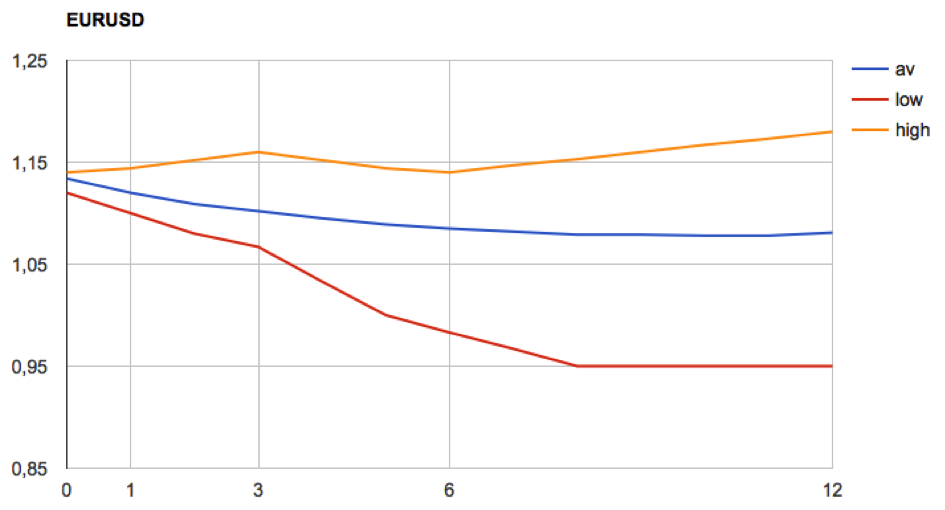Uitgelicht: Banken overwegen cash op te slaan in kluizen om ECB te ontwijken
| 22-08-2016 | Olivier Werlingshoff, Udo Rademakers, Douwe Dijkstra, Roger Boxman |

Afgelopen week verscheen het bericht dat onder andere de ING bank serieus heeft overwogen om geld in cash op te slaan in kluizen om zo de maatregelen van de ECB te ontwijken. De ECB vraagt een ‘boete’ wanneer banken hun geld willen opstallen. De gedachte hierachter is dat financiële instellingen meer geld uitlenen en de economie zo gestimuleerd wordt. Niet alle banken beschouwen het opslaan van cash geld in kluizen als een serieus alternatief. (bron: rtlz.nl) Wat vinden onze experts?
 Olivier Werlingshoff
Olivier Werlingshoff
“Ik denk niet dat het opslaan in kluizen een optie is. Dit is ook in strijd met het doel van de negatieve rente die de ECB heeft ingevoerd. Als banken het geld in cash gaan opslaan, heeft dit stimuleringsmiddel van de ECB geen zin. Ik begrijp echter wel dat banken naar deze optiemogelijkheid kijken. Zij zitten klem tussen aan de ene kant de interne regels van risico’s en rendementen bij het uitgeven van leningen en aan de andere kant de druk van de ECB om meer te gaan uitgeven.”
 Udo Rademakers
Udo Rademakers
“Er zijn momenteel partijen die geld zelf opslaan om in worst-case-scenario geld achter de hand te hebben. Het omzeilen van de negatieve (en wellicht nog verder dalende) rente helpt een handje om met de gespaarde kosten de opslag te financieren. Indien veel partijen voor zo´n type oplossing zouden opteren, kan dit druk opleveren bij de ECB. Echter, de ECB zou hierop kunnen reageren door nieuwe, versnelde regelgeving tot inperking van cash opslag in te voeren (lees: een verbod). Dit lijkt ondenkbaar, maar de centrale banken hebben vaker voor verrassingen gezorgd in het verre en recente verleden…
Ik zie de rentepolitiek van de ECB momenteel meer als een “belasting op vermogen” (wat in zeer veel jaren is opgebouwd) dat zal leiden tot een stimulering van de economie. Tot nu toe heeft de trukendoos van de ECB tot een uitstel van executie geleid en weinig langdurige effecten gesorteerd.
Overigens heeft de ECB besloten om de productie van EUR 500 biljetten einde 2018 te beëindigen (onder het mom dat deze biljetten voor criminele doeleinden worden gebruikt).
Zou dat een andere mogelijke reden zijn om geld opslaan lastiger te maken? In deze tijden van onzekerheid is diversifiëring mijn devies.”
 Douwe Dijkstra
Douwe Dijkstra
“Persoonlijk vind ik het cash in kluizen opslaan een nauwelijks serieus te nemen optie. Banken maken nog zoveel marge op wel verstrekt krediet dat de aan de ECB te betalen negatieve rente eerder peanuts is dan dat het “vreet aan de winst van de banken”. Beter kunnen banken hun kredietverlenende taak serieus nemen in plaats van aanhoudend aanvullende KYC (Know Your Client) uit te vinden om daar hun klanten mee lastig te vallen.”
Roger Boxman
 Een goedkopere manier om van overtollig kasgeld af te komen is om leveranciers of werknemers eerder te betalen. Geld in kluizen opslaan kan uiteraard wel maar is kostbaar. Zeker nu de biljetten van € 500 zijn afgeschaft.
Een goedkopere manier om van overtollig kasgeld af te komen is om leveranciers of werknemers eerder te betalen. Geld in kluizen opslaan kan uiteraard wel maar is kostbaar. Zeker nu de biljetten van € 500 zijn afgeschaft.




 Simon Knappstein
Simon Knappstein

 De historisch lage rente, op 15-06-2016 publiceerden we al een
De historisch lage rente, op 15-06-2016 publiceerden we al een 









